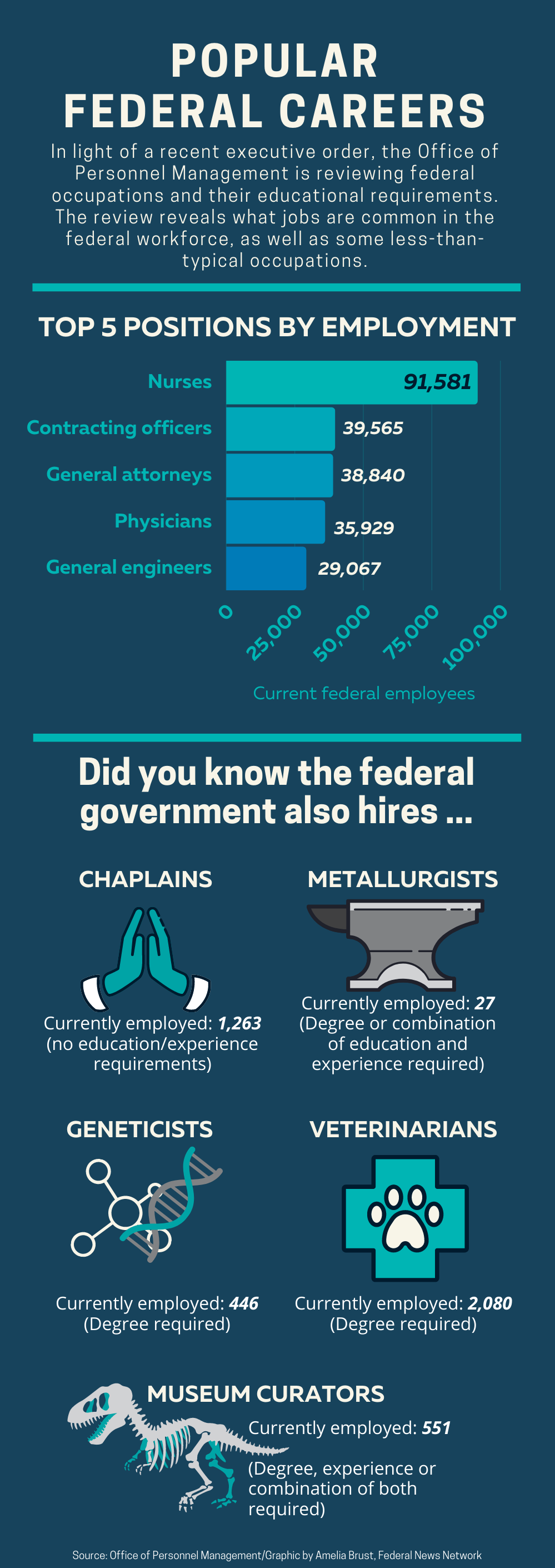In implementing recent hiring EO, OPM review reveals popular federal jobs
A new draft policy from the Office of Personnel Management reveals what jobs are common in the federal workforce and the qualifications currently needed to hold...
The Trump administration recently ticked another item off its to-do list in its ongoing efforts to implement the president’s recent federal hiring executive order.
The hiring EO, which the president signed back in June, removes college degree requirements from federal positions unless they’re legally necessary — and it urges agencies to use skills-based assessments when evaluating the abilities of a job applicant.
The Office of Personnel Management has already outlined the steps it’s planning to implement the federal hiring order, and it recently issued new guidance to solicit agency feedback and clarify how they should use more skills-based assessments to vet and select qualified candidates.
Many agencies already use such assessments to help them vet candidates who have been certified and deemed “minimally qualified” for the job.
But under the federal hiring EO, agencies must use “assessments at the pre-certification stage as a third, and co-equal, mode of establishing minimum qualification (in addition to education and experience),” OPM said late last month in a new memo.
“Developing competency-based assessments will benefit the federal workforce by generating larger pools of highly skilled job candidates from which agencies may choose their employees, thereby enabling highly skilled workers with non-traditional educational paths to serve the American public,” Michael Rigas, OPM’s acting director, said in a memo to agencies.
The memo includes a draft version of OPM’s new General Schedule qualifications policy. The policy itself lists dozens of federal occupations that currently require educational credentials or formal training and experience, or some combination of both.
As a senior agency official told Federal News Network earlier this summer, writing the draft guidance required OPM and other agencies to review more than 400 occupational qualification standards. The official described it as the the biggest shift in the way agencies evaluate and assess applicants for federal employment since the Carter administration abandoned the Professional and Administrative Careers Examination (PACE) in the early 1980s.
With the release of this latest guidance, OPM wants agencies to review the list and comment on the occupations most relevant to them. Their comments are due next Friday.
OPM’s draft policy lists more than 130 different federal occupations that require educational credentials, some sort of formal training or a combination of both.
Here’s a look at a few of them.

OPM spent the end of the summer hosting listening sessions with industry to learn how companies use skills-based assessments for their own hiring purposes, as well as other sessions with agency leaders and chief human capital officers to hear their frustrations with current federal procedures.
The final version of OPM’s General Schedule qualifications policy is expected later this fall.
Copyright © 2024 Federal News Network. All rights reserved. This website is not intended for users located within the European Economic Area.
Nicole Ogrysko is a reporter for Federal News Network focusing on the federal workforce and federal pay and benefits.
Follow @nogryskoWFED
Related Stories




